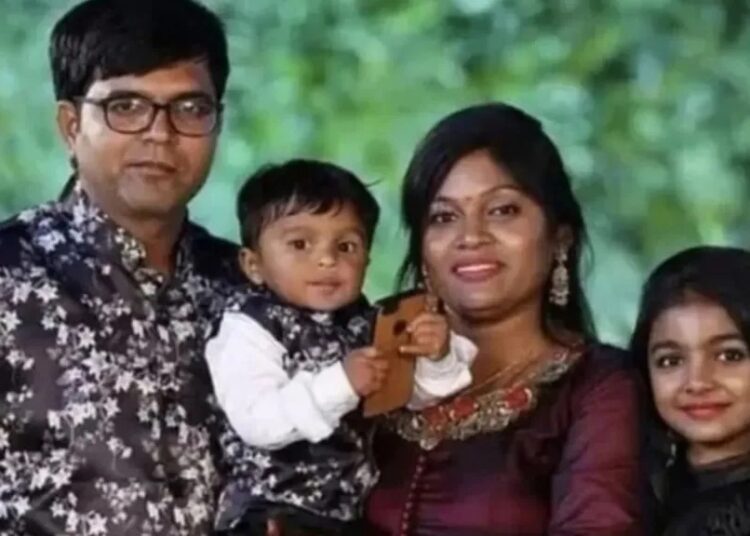Nearly three years after an Indian family tragically froze to death at the US-Canada border, two men are set to stand trial for their alleged role in the ill-fated attempt to smuggle the family into the United States.
The family—Vaishaliben Patel, her husband Jagdish, and their two children, 11-year-old Vihangi and 3-year-old Dharmik—died during a harrowing journey to cross the border amid a severe winter blizzard in January 2022.
The family had travelled to Canada from their home in western India on visitor visas, with hopes of entering the US. They became separated from a group of other Indian nationals attempting the same journey, and their bodies were found by Canadian authorities in a field just 12 meters from the border. The temperature that night plunged below -35°C (-31°F), causing the family to succumb to the bone-chilling cold.
Authorities initially became suspicious when they discovered a backpack containing child’s clothing and toys among a group of seven Indian nationals, arrested by US Border Patrol agents who were investigating potential smuggling activities. One of the individuals had been carrying the backpack but had no children with him. He informed authorities that the family had been with the group but had gotten lost during the crossing.
Two men, Harshkumar Ramanlal Patel and Steve Anthony Shand, were facing charges related to the family’s death. Both men are accused of helping to facilitate the deadly smuggling attempt. Patel is charged with human trafficking, criminal conspiracy, and culpable homicide not amounting to murder, while Shand faces similar charges. They have both pleaded not guilty to the charges.
The trial was set to begin with jury selection on Monday, with both Patel and Shand facing the consequences of their alleged actions in the tragic smuggling operation.
The investigation into the smuggling network uncovered a complex international operation, with alleged links between India and North America. Court documents revealed that the Patels and other migrants were allegedly connected to a network that facilitated illegal immigration via fraudulent student visas, leading to the US and Canada. One of the smuggling ring’s victims, identified only as “VD,” revealed that he had paid $87,000 (around £68,519) to agents in India to facilitate his entry into Canada and eventual crossing into the US.
According to court records, Patel, who is not related to the deceased family, was a key player in organising the smuggling operation. Authorities alleged that he had been in regular communication with Shand regarding logistics, travel arrangements, and weather conditions. In one text, Shand is said to have warned Patel, “Make sure everyone is dressed for blizzard conditions please.” Shand, arrested on the same day the Patels’ bodies were discovered, was driving a van filled with Indian nationals near the Minnesota-Canada border. During his arrest, Shand was found with a 15-passenger van and two individuals who had overstayed their US visas.
Patel, who managed a casino in Florida and had been previously denied a US visa five times, was believed to have recruited Shand to assist with transporting migrants across the border.
While the tragic story of the Patel family’s death was a focal point, it was part of a larger issue. Since their deaths, at least two other families have died attempting the same perilous journey across the US-Canada border. Experts warned that such smuggling operations could increase as more migrants seek to bypass legal immigration channels, especially amid fears of mass deportations under the incoming US administration of Donald Trump.
The Patel family is believed to have been connected to the two men through contact in Toronto, who was connected to the India-based organisation that used student visas to grant people entry into Canada and then smuggle them into the US.
A lawyer for Mr Patel said in a statement to the BBC: “We look forward to the trial and the chance to show that Mr Patel took no part in this tragic event.”
No other lawyers involved in the case commented.
Two Indian nationals in Gujarat were also arrested by police in connection with the Patels’ death. Indian police said the men were “illegal immigration” agents.
A related investigation into this India-based operation has revealed that once crossing into the US, some Indian nationals would then be transported to a Chicago restaurant chain – unnamed by investigators – where they worked for “substandard wages” to pay off debts they owed to the smugglers.
It is unclear what the Patels’ final destination was, or why they had made the treacherous and unlawful journey.
Shortly after their death, residents from their home village in India told the BBC that they had known of the family’s plan to travel and that they had arrived in Canada on visitors’ visas. Their relatives grew concerned when messages from the family stopped coming, about a week after they had left.
Both Jagdish and Vaishaliben were working at one point as teachers and appeared to have a well-anchored life in India. But like many in the village of Dingucha, they felt compelled to leave, idealizing a life abroad full of opportunity.
In the wake of the Patels’ deaths, their village in Gujarat, India, mourned the loss of a family that, like many others, dreamt of a better life abroad. “Every child here grows with the dream of moving to a foreign country,” a councilman from Dingucha, their home village, told BBC at the time.
Following the family’s deaths, US Border Patrol agents noticed a disturbing pattern of fresh footprints near the border every Wednesday, which led them to intensify their search efforts. On the morning of January 19, 2022, despite the snowstorm, they discovered the bodies of the Patel family.
“What I am about to share is going to be difficult for many people to hear,” said Assistant Commissioner Jane MacLatchy of the Royal Canadian Mounted Police. “It is an absolute and heartbreaking tragedy.





